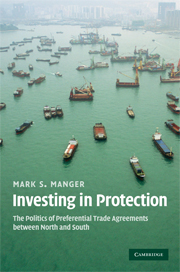Book contents
- Frontmatter
- Contents
- List of figures
- List of tables
- Acknowledgments
- List of abbreviations
- Japanese names and conventions
- 1 Introduction
- 2 Framework for analysis
- 3 NAFTA – the original sin?
- 4 Iberian ties: the EU–Mexico free trade agreement
- 5 The odd couple: the Japan–Mexico free trade agreement
- 6 The far side of the world: preferential trade agreements with Chile
- 7 Japan's NAFTA route: preferential trade agreements with Malaysia and Thailand
- 8 Conclusions and implications
- References
- Index
8 - Conclusions and implications
Published online by Cambridge University Press: 08 January 2010
- Frontmatter
- Contents
- List of figures
- List of tables
- Acknowledgments
- List of abbreviations
- Japanese names and conventions
- 1 Introduction
- 2 Framework for analysis
- 3 NAFTA – the original sin?
- 4 Iberian ties: the EU–Mexico free trade agreement
- 5 The odd couple: the Japan–Mexico free trade agreement
- 6 The far side of the world: preferential trade agreements with Chile
- 7 Japan's NAFTA route: preferential trade agreements with Malaysia and Thailand
- 8 Conclusions and implications
- References
- Index
Summary
Trade liberalization is a powerful force for increasing the wealth of nations. As an avenue to development, the reintegration of developing countries into the global economy heralds profound changes in North–South relations. The increasing popularity of North–South PTAs, a crucial dimension of this reintegration, is one of the most striking developments in the international trade regime since the end of the Cold War. This study began by asking why these agreements have proliferated so rapidly since the early 1990s.
Most existing explanations tend to lump all preferential trade agreements into the same category. Moreover, much of the public discourse about PTAs focuses on the opening of markets. Yet for developed economies preferential trade agreements with developing countries offer only limited opportunities for exports. What is more, these PTAs often exclude significant shares of trade from liberalization or delay the reduction of tariffs for long periods, precisely in those areas where the participating countries are the most competitive. Other studies argue that the proliferation of North–South PTAs resembles a beauty contest, in which developing countries with the most liberal trade policies are rewarded with access to developed country markets. But these explanations offer little account of the interests of rich countries in signing on to these deals.
Finally, many scholars and practitioners claim that deadlock in the WTO has created the impetus to pursue PTAs. While stalling multilateral negotiations have surely convinced countries of the need to find alternative venues, this explanation can only be a partial account.
- Type
- Chapter
- Information
- Investing in ProtectionThe Politics of Preferential Trade Agreements between North and South, pp. 220 - 238Publisher: Cambridge University PressPrint publication year: 2009



